- Home
- Lauren Willig
The Summer Country Page 33
The Summer Country Read online
Page 33
“Are you mad?” Robert half rose from his seat, staring at Mrs. Boland with a combination of scorn and rage. “I thought you were buying Beckles sugar!”
“Mr. Davenant made a compelling argument,” said Mrs. Boland firmly. “I’ve looked at the books, and I believe there’s promise in it.”
“Oh, the books,” said Robert. “Is that what they’re calling it now?”
“Robert,” said his wife flatly. “Stop.”
“Do you realize what this means?” Robert seemed to have lost all awareness that there were other people at the table. “We’ve half the crop with nowhere to sell it! All because some jumped-up bogtrotter’s widow fancies my idiot brother.”
Mr. Fenty pushed back his chair with a scrape. “Take that back.”
The other men all half rose, but Charles was there first, clamping a hand on Jonathan’s arm. “He’s drunk.”
“The wine is in and the wit is out!” offered the captain.
Mrs. Poole giggled.
“He’s insulted a worthy lady.”
“Lady, is it?” Robert tried to push back from his chair and almost managed to send it over with himself still in it. “With a complexion like that, you have to wonder just where old Boland picked her up.”
“That’s enough, Robert.” Charles had one hand on Fenty’s shoulder, holding him in check. “Apologize.”
“To whom? Your pet Redleg? Or her?” He made no effort to hide his scorn. “This is what happens when women play at men’s business.”
“Get out.” Charles’s voice was clear as breaking glass, each word sharp-edged. “You are no longer welcome here.”
Robert looked at him incredulously, his blond hair flopping in front of his eyes. “You can’t throw me out of my own home.”
“It’s not your home,” said Charles, and Jenny could see how much it cost him, how hard it was for him to repudiate his own blood. “It’s mine. And I cannot have my guests insulted.”
Robert looked like he might have argued, but Mary Anne rose from her chair, gathering up her gloves and fan. With a put-upon sigh, she reached for her husband. “Come along, Robert. Let’s go soak your head in a trough.”
“Get off me, you harpy.” Robert pulled away from her and went sprawling. He struck out at his hapless manservant, who bent down to help him up. He staggered to his feet. “I don’t need you. I don’t need any of you. I’ll go where I’m wanted.”
There was a horrible silence as he lurched from the room, Derry jogging behind him, grabbing him as he stumbled.
A moment later, they all heard the sound of retching from the veranda.
“It’s the brandy does it,” said the captain virtuously. He held up his glass to be refilled. “I make a practice of never drinking but claret and good Barbados rum punch.”
To Mary Anne, Charles said, “I’m so sorry.”
He was, Jenny knew, apologizing for more than just the evening.
Mary Anne smiled determinedly at him. In a carrying voice, she said, “Is there any more treacle tart? You must have your cook send to mine with the receipt. When ours attempts it, it always comes out looking and tasting like molasses mixed with mud.”
Mrs. Poole, looking for hysterics, looked greatly disappointed. Following Mary Anne’s lead, the conversation became general, although there was still a tense set to Fenty’s shoulders and a troubled look to Charles’s eyes.
When the guests had taken themselves off, earlier than usual, Charles seized the opportunity to speak to Mary Anne.
“I’m so very sorry. For everything. I feel responsible.”
Mary Anne shrugged, turning her back to Jenny so Jenny might wrap her in her shawl. “You know how he gets. We’d counted on the Boland contract.”
“I didn’t think. I ought to have realized . . .” Charles looked at Mary Anne with concern. “Beckles sugar is justly famed. Surely you can find another buyer?”
“Easily,” said Mary Anne, lifting her chin, although Jenny knew that it wasn’t going to be as easy as that.
“Would you like to stay the night at Peverills?” Jenny frowned at Charles over Mary Anne’s shoulder. He wasn’t meant to know of the fights between Mary Anne and Robert; she had told him in confidence. Charles checked himself, adding quickly, “Robert’s not pleasant when he’s in a temper. I’d hate to see you suffer for my thoughtlessness.”
“He’ll be less pleasant if I’m seen to be spending the night here. Unless you mean to keep Mrs. Boland as chaperone? No. I’m not afraid of Robert.” Mary Anne’s eyes narrowed. “I’ve a strong lock on my door.”
But Robert was already there when they got back, sitting on the chair beside Mary Anne’s bed, a half-empty decanter beside him.
“If it isn’t my beloved wife,” he said, lifting the decanter.
“Mistress.” Jenny tugged on her dress. “Come away.”
“What in the devil were you thinking?” demanded Mary Anne, advancing into the room, ignoring Jenny’s entreaties. “Insulting Mrs. Boland! In front of the Pooles! Do you want to be shunned by every sugar trader from Bridgetown to Bristol?”
“You want to talk to me about being shunned?”
In a sudden, violent movement, Robert lurched to his feet, flinging the glass decanter so that it exploded against the wall behind Mary Anne’s head. Crimson trails of claret trickled down the pale-papered wall like blood. Jenny put her hand to her arm and realized she was bleeding, a shallow, stinging cut where a shard had grazed her.
Robert advanced on Mary Anne, glass crunching beneath his boots. “Talk to me about a wife who locks her door.”
A sharp wail rose from the next room, Neddy roused from sleep, angry and frightened.
“Shut that brat up,” said Robert. As Jenny paused, caught between her mistress’s need and the baby, he shouted, “Go, damn you! Who’s master here?”
Mary Anne nodded to her, and Jenny ran to Neddy, whose wails had doubled in volume as he discovered that he was wet as well as awake, and it was dark and people were shouting, and no one was picking him up even though he was calling and calling.
As Jenny hastily jiggled him, she heard behind her, through the open door, “Is he mine, Mary Anne? Or is he my brother’s? Have you been sneaking off to Peverills behind my back?”
“Oh Lord,” snapped Mary Anne. “Not that again. If you had any brains that weren’t in your cock, you’d know better.”
“You want me to show you my cock?”
There was the sound of a chair overturning, cloth ripping, grappling, muffled cries.
“—my wife,” Robert grunted, and then grunted in pain rather than pleasure as Mary Anne landed a knee between his legs. Jenny could hear him scrabbling, cursing, crying out as he landed in some broken glass, and then Mary Anne’s cry of distress as he grabbed her, forcing her back against the wall. “—show you—”
Jenny clutched Neddy, trying to decide what to do. To come to her mistress’s aid would be an offense punishable by death.
She could hear a thump as her master pushed her mistress back against the wall. Mary Anne didn’t cry or cry out; Jenny heard her sobbing pant, her master’s noises of satisfaction, and then a loud and horrible cracking noise, followed by something heavy tumbling to the ground.
There was silence.
Neddy let out an exploratory series of grunts and grumbles. Jenny clutched him to her chest and hurried into the bedroom.
Mary Anne was holding her mahogany writing box in both hands, lifted above her head. Her hair was down around her back, half in her pins, half out. There was a bruise on one cheek, another on her collarbone where her dress had been torn away. One cameo earing still dangled from her ear; the other had fallen on the carpet, lying next to a limp male hand.
Robert lay sprawled on the floor, his pantaloons undone, his shirt billowing around him, his blue eyes as glossy and still as the glass of the decanter. Blood seeped beneath his head, unfurling like crimson cloth.
“He’s dead.” Jenny pressed Neddy’s head close to
her chest, ignoring his mumfle of protest. “He’s dead.”
Slowly, Mary Anne lowered her arms, setting the writing box down carefully in its spot on her escritoire.
“Get Dr. MacAndrews,” she said. “My husband’s had an accident. Did you hear me? He’s had an accident.”
Chapter Twenty-Three
Bridgetown, Barbados
May 1854
“Forgive our disarray. My wife and daughters have left for the country and I am to join them in a matter of hours.”
Mr. Turner received Emily in the same room to which she had first been escorted four long months ago. It felt more like four years. The fossils were still in their places in the curio cabinets, the works of philosophy and theology on the shelves, but there was already the slightly sleepy air of a house abandoned, the dust motes dancing lazily in the sunshine, the furniture waiting only for the guest to depart so the holland covers could be set over them.
Tea and cakes had been set out, but it was a bachelor effort, not the bounty Mrs. Turner might have commanded. It didn’t matter; Emily wasn’t terribly hungry. She was feeling rather foolish about the whole affair, but having come so far, she knew there was no turning back.
“I hope you didn’t delay for my sake,” said Emily.
“Not at all,” said Mr. Turner, in a way that implied just the opposite. “I sent to Beckles this morning to cancel our appointment, but my message must have missed you. Have you come to discuss the sale of Peverills? If so, I would advise that you wait. This isn’t a good time to sell.”
“No. No, it’s not that.” Emily worried at the clasp of her net bag, the one Laura had worked for her a hundred years ago, back at Miss Blackwell’s, adorned with fat cabbage roses and extravagant green vines. “You mentioned, some time ago, that you had once been my grandfather’s groom?”
Mr. Turner leaned back against the settee, propping one ankle against the opposite knee. Emily had an impression of leashed power, a tiger being kind to a kitten. “Yes?”
“I made a visit to St. Andrew, to my grandfather’s people. There was an old woman there, Old Betty.” Mr. Turner’s attention never wavered, but she could tell he was waiting for her to get to the point. Emily took a deep breath. “She told me my grandfather kept a child there, an ‘outside’ child, she called it.”
“Ah,” said Mr. Turner.
“Is there—do you—that is, could you tell me anything about that child?” Emily linked her fingers together, leaning forward. “I need to know, was it my grandfather’s child?”
Mr. Turner looked at her, taking her measure, her old dress and sensible hat. She hadn’t wanted to wear Mrs. Davenant’s borrowed finery to go to town. It was one thing to play make-believe at Beckles, but she had felt, somehow, that to take that person, that Emily, to Bridgetown would be to cross a line she couldn’t cross back.
“I suppose there’s no harm in telling you now,” said Mr. Turner at last.
Emily waited, painfully aware of every noise around them, every hoofbeat in the street, every tick of the clock. “You knew her, then?”
“The child? Yes. I didn’t bring her to Scotland, but I went with your grandfather when he visited. The fiction, then, was that she was your grand-aunt’s child. Rachel Fenty,” he amended. “Everyone there knew otherwise, of course, but it was what your grandfather told strangers.”
“What was she like? The little girl.”
“A baby,” said Turner. His lips spread in a smile at Emily’s obvious disappointment. “I was a boy of eight. I had no interest in babies. One looked much like another. Your grandfather doted on her, though. We never went up that cliff without treasures in the saddlebags. Embroidered linens and wooden toys. There wasn’t another child in St. Andrew so pampered. His sisters didn’t mind it, though,” he added pragmatically. “Their children got the leavings. And the money for keeping her.”
Emily’s hand closed around the locket at her throat. She’d pinned it to her collar like a broach, a talisman. “So it was true, then. The child was my grandfather’s.”
“What? No.” Mr. Turner shook himself out of the past.
“I don’t understand,” said Emily, feeling very stupid and very slow. “I’d thought they said—”
“That’s what the people there believed, of course, and it didn’t do to disabuse them. But the child—no.” Mr. Turner regarded her expressionlessly, and she had the sense he was doing sums in his head, weighing his options. “The child that your grandfather brought to Scotland wasn’t his. She was the child of Charles Davenant and a slave, Mary Anne Davenant’s maid Jenny.”
“Oh,” said Emily, feeling her brain go blank with surprise. She’d been prepared to show the miniature of her mother, to grapple with the reality of her parentage, but it wasn’t her parentage at all. Her grandfather had been doing a kindness for someone else. She had stumbled into someone else’s tragedy.
“You see their problem,” said Mr. Turner conversationally, politely giving her time to recover her wits. “The girl belonged to Mrs. Davenant. So would the child. So they hid it.”
“The woman in St. Andrew—she said my grandfather took the child away again?”
“Yes. I was with him for that,” Mr. Turner said reminiscently. It was, Emily thought, more than a space in time for him. He had been a different person then, a boy, a slave, a world away from the man of property he had become. “We brought the child to Peverills. The story put out was that she’d come from Portugal.”
“The Portuguese ward.” Emily didn’t realize she’d spoken the words aloud until she saw Mr. Turner looking at her. “So she wasn’t Portuguese at all?”
“No more than you or I,” said Mr. Turner gravely. “Your grandfather never spoke to you of it?”
Emily shook her head. “I only learned of it from Mr. Davenant.”
Can you imagine that? To have made it through a war safely and then to die like this? George had said. There had been no war, but it was almost worse, what the child had survived; to be wrested from slavery only to perish in a rising meant to free those like her.
“That poor child,” said Emily with feeling.
Mr. Turner considered a cake and set it down again, uneaten. “There is a bit more to the story.”
“Mr. Davenant abandoned Peverills, I know. I can’t wonder at it. The poor man.” To engage in so much subterfuge to extricate his child from the toils of slavery, only to see her die in a fire. No wonder Mr. Davenant had fled from Peverills and never returned, never rebuilt. Emily thought of the shadowy figure behind Mrs. Davenant in the portrait at Beckles. “Whatever became of the mother? Jenny?”
“She was also lost in the fire,” said Mr. Turner. “Like her child.”
“Uncle? Shouldn’t you be—” Dr. Braithwaite checked at the sight of Emily, comfortably ensconced on a Louis XV chair. He regarded her with unmitigated horror. “What are you doing here?”
“I came into town to see your uncle,” said Emily, not a little offended. She had thought they had parted on friendly terms.
“Well, get back out again,” said Dr. Braithwaite. Prowling around her chair, he snapped out a series of questions. “Did you go anywhere else? Did you see anyone? Take food with anyone?”
“I came from Beckles this morning. The carriage brought me straight here. Are you quite well, Dr. Braithwaite? Do I need to make you a tisane?”
“You need to get back to Beckles.” Dr. Braithwaite pressed his fingers to his temples, breathing in deeply. “Did no one tell you? It’s not safe in Bridgetown. The Board of Health is posting the notices today. Asiatic cholera.”
Emily’s skin prickled; she could feel the cold sweat forming beneath her arms. “How many dead so far?”
“We don’t know for certain. There are a dozen dead already in Lightfoot Lane, six of them in the Goodrich house alone. And more in Jemmott’s. But it’s moving. It’s moving. And so had you better,” Dr. Braithwaite said, turning to his uncle. “Aunt Ada would never forgive me if I let you come to grief.”
“If you let me?” said Mr. Turner, amused. “I’m master of my own destiny, my lad.”
For a moment, Dr. Braithwaite grinned at his uncle, and the resemblance between the two men was startling. But his amusement quickly faded. “Not with the cholera in the town. With cholera, no man is master of anything but a wooden box in the ground.”
“Always so lyrical,” said Mr. Turner mildly. “Miss Dawson, may I offer you a ride from town? I go to St. Philip. I pass by Beckles on my way.”
Emily shook her head. Her lips felt numb. “I need to wait for my cousin. We came by carriage from Beckles. He was to see a Mr. Montefiore. . . .”
A look passed between the two men. Reluctantly, Dr. Braithwaite said, “I attended on Mr. Montefiore yesterday.”
He didn’t need to tell her what he meant. “Oh no.”
Dr. Braithwaite lowered his chin. “Stomach cramps, evacuations of the bowel.”
Emily’s throat felt very dry. “I know. I’ve seen it before. We had it in Bristol, in forty-nine. There was so much death. . . .”
Whole families dead. Babies, alone in the world, crying next to the bodies of their dead mothers. There had been so little she could do, so little to stem the tide. She could still smell it, in the back of her nostrils, the cologne of the handkerchief she had tied around her face mingled with the putrid stench of death. She could smell it in her dress, in her hair; she could taste it at the back of her throat, after all this time.
At sixteen, she had, secretly, been a little in love with the young doctor who had worked so indefatigably for the poor of Stapleton Workhouse. Until he had died too. “Even Dr. Williams died. He died tending to his patients.”
“I don’t need to tell you how dangerous it is, then.” Dr. Braithwaite made to hustle her out. “Go with my uncle. Get away while you can. I’ll find your cousin.”
“Are you talking about me?” There was a heavy tread on the floor of the hall and Adam tumbled through the door of the study, catching at the doorframe to steady himself. With the exaggerated dignity of the inebriated, he said, “My apologies, sir. There was no one at the door.”

 That Summer
That Summer The Mischief of the Mistletoe
The Mischief of the Mistletoe The Mark of the Midnight Manzanilla
The Mark of the Midnight Manzanilla The Other Daughter
The Other Daughter The Ashford Affair
The Ashford Affair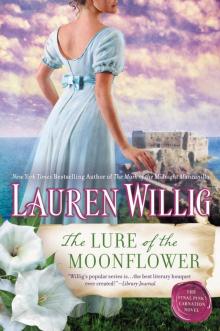 The Lure of the Moonflower
The Lure of the Moonflower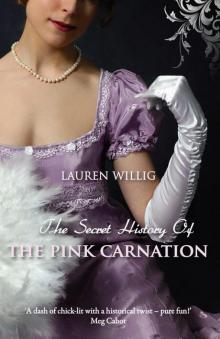 The Secret History of the Pink Carnation
The Secret History of the Pink Carnation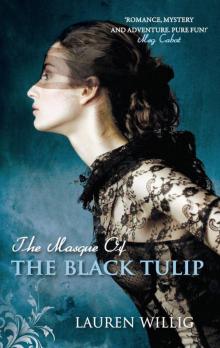 The Masque of the Black Tulip
The Masque of the Black Tulip The Passion of the Purple Plumeria
The Passion of the Purple Plumeria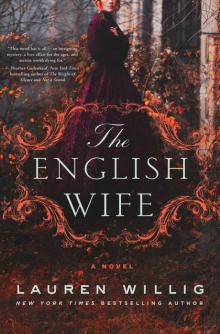 The English Wife
The English Wife The Garden Intrigue
The Garden Intrigue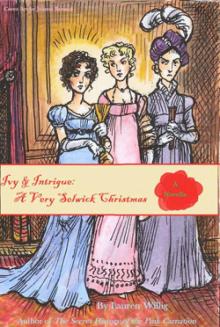 Ivy and Intrigue: A Very Selwick Christmas
Ivy and Intrigue: A Very Selwick Christmas The Orchid Affair
The Orchid Affair The Summer Country
The Summer Country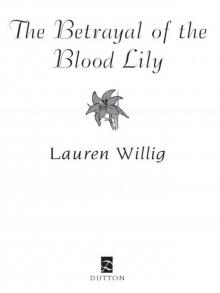 The Betrayal of the Blood Lily
The Betrayal of the Blood Lily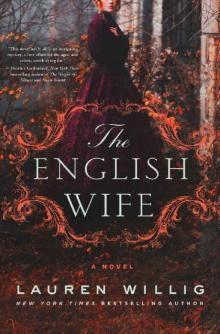 The English Wife: A Novel
The English Wife: A Novel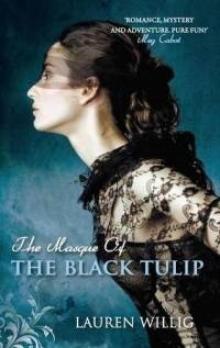 Masque of the Black Tulip pc-2
Masque of the Black Tulip pc-2 The Secret History of the Pink Carnation pc-1
The Secret History of the Pink Carnation pc-1 That Summer: A Novel
That Summer: A Novel The Mischief of the Mistletoe: A Pink Carnation Christmas
The Mischief of the Mistletoe: A Pink Carnation Christmas